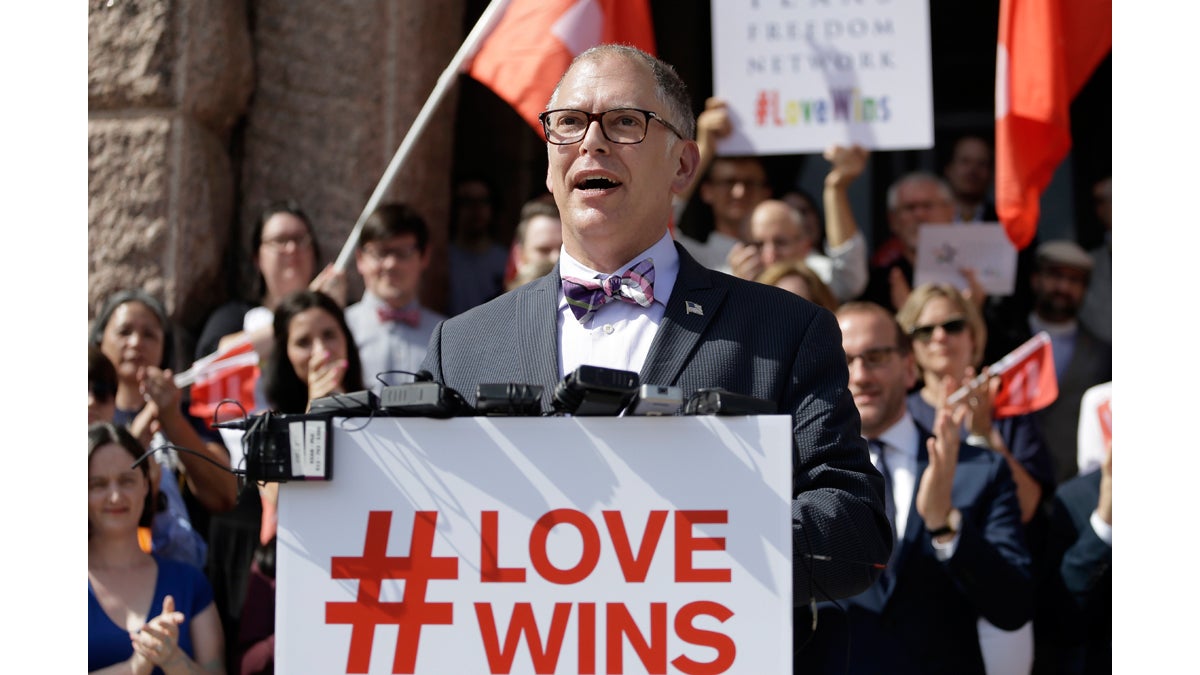Will love really win on same sex marriage?
Listen
Jim Obergefell, the named plaintiff in the Obergefell v. Hodges Supreme Court case that legalized same sex marriage nationwide, is backed by supporters of the courts ruling on same-sex marriage on the step of the Texas Capitol during a rally Monday, June 29, 2015, in Austin, Texas. The Supreme Court declared Friday that same-sex couples have a right to marry anywhere in the United States. (Eric Gay/AP Photo)
In the past week, the Supreme Court has reshaped, recast, and in some ways, redefined what it means to be American.
We now live in a country where everyone can have access to health insurance, where everyone can seek justice in housing, and where everyone, regardless of their sexual orientation, can marry the person whom they choose.
That last case, Obergefell v. Hodges, essentially legalized same sex marriage in all 50 states.
And while many in my community—the faith community—have cast the legalization of same sex marriage as a catastrophe, I don’t think that’s the case.
To be clear, my faith tells me that marriage is between a man and a woman. But that’s not the only thing my faith says on this matter. My faith also tells me that God puts authority in place, and that I am to love my neighbor as myself.
So while I am not among those who support the Supreme Court’s decision, my faith tells me to respect the authority that made that decision, and more importantly, to love and respect my neighbors, no matter their beliefs.
Everyone who claims to be speaking from the foundation of faith doesn’t share those sentiments.
Take Texas Attorney General Ken Paxton, a man for whom democracy seems to be a fine system, so long as democracy goes his way.
Paxton, after all, is an elected official who ran for office in a democratic system. His job as the state’s top law enforcement official is to uphold the law.
It’s ironic to watch someone who won his job through the democratic process condemn that very process. It’s sad to watch him do so in the name of faith.
In a statement, Paxton called the same-sex marriage decision “a judge-based edict that is not based in the law” while condemning the Supreme Court Justices as “unelected judges.”
Paxton’s statement went on to say, “But no court, no law, no rule, and no words will change the simple truth that marriage is the union of one man and one woman. Nothing will change the importance of a mother and a father to the raising of a child. And nothing will change our collective resolve that all Americans should be able to exercise their faith in their daily lives without infringement and harassment.”
I’m all for religious liberty, but I am tired of people using religious liberty as a cloak for their own hypocrisy. If you are an elected official, you have taken an oath to uphold the law. If you don’t want to do so for religious reasons, then resign. But you can’t in one breath say you will protect and defend America’s laws, and in the next breath refuse to do so.
Doing so makes you a liar, and I don’t need liars speaking for my faith.
To be frank, too many of us have remained silent as hatemongers have misused religion to drive people apart. Too many of us have watched quietly as charlatans have misrepresented what faith truly means.
But this is not a time to remain silent. This is an opportunity to speak up—not in a spirit of hatred and fear, but in a spirit of love.
Of course, not everyone believes that’s possible, starting with Samuel Alito, one of four Supreme Court Justices to dissent in this case.
“I assume that those who cling to old beliefs will be able to whisper their thoughts in the recesses of their homes,” Alito wrote in his dissenting opinion, “but if they repeat those views in public, they will risk being labeled as bigots and treated as such by governments, employers, and schools.”
I hope Alito’s assumptions are wrong. Even more importantly, I hope those on opposite sides of this issue will understand that disagreement does not equal bigotry. Because just as the law says we can’t discriminate when it comes to same sex marriage, the law says we can’t discriminate on the basis of faith.
This is a moment that will test what those laws truly mean.
But as we go through those tests, I will hold on to the one thing that has never failed me—my faith. In doing so, I will make every attempt to love my neighbors as myself, whether they are black or white, Christian or Muslim, gay or straight.
In a time of such tremendous social change, I can only pray that my neighbors—no matter their stance on same sex marriage—will return that love in kind.
WHYY is your source for fact-based, in-depth journalism and information. As a nonprofit organization, we rely on financial support from readers like you. Please give today.


